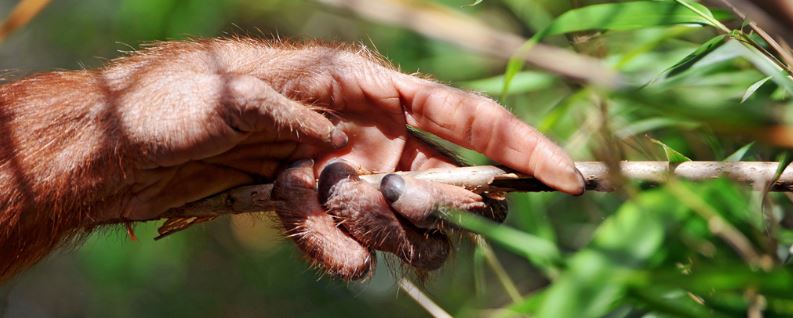


 10:41:6
10:41:6  2024-05-05
2024-05-05  1246
1246

Humans are far from the only animal known to use nature as a medicine cabinet to soothe their pains and ailments. Yet using materials to treat wounds is a behavior that until recently was seen in just one other primate – chimpanzees.
Thanks to a recently published study by an international team of researchers, we can add another species to that exclusive club.
"To the best of our knowledge, this study is the first systematic documentation of the putative active wound treatment with a biologically active plant substance in… non-human species," the researchers write in their paper.
Several years ago, Max Planck Institute primatologist Isabelle Laumer and colleagues observed a male Sumatran orangutan (pongo abelii) named Rakus dedicate over half an hour to the preparation, consumption, and repeated application of a known medicinal plant to an open wound on his face.
The mature male, estimated to be in his 30s, smeared the chewed up leaf juices to only his wound with his fingers multiple times, until he'd fully covered the wound with leaf pulp. As he did not smear any other parts of his body Laumer and her colleagues believe he was intentionally treating his injury.
The researchers observed this behavior in Gunung Leuser National Park, Indonesia. They saw Rakus carefully collecting leaves from the climbing plant, Akar Kuning (Fibraurea tinctoria) on 25 June 2022, three days after they'd first noted the open wound on his face received in an altercation with another male.
F.tinctoria has long been used in traditional medicine to treat wounds and other conditions like diabetes, dysentery, and malaria.
Analysis of the plant's chemical composition has revealed antibacterial, anti-inflammatory, antifungal, and antioxidant properties that are all helpful for wound healing.
"As F.tinctoria has potent analgesic effects, individuals may feel an immediate pain release, causing them to repeat the behavior several times and subsequently apply solid plant matter possibly to also cover the wound as a protection against flies," the researchers explain.
As such, it is possible Rakus discovered the pain relief incidentally while eating the plant, or it's possible this wound treatment technique may be learned. While the behavior hasn't been observed before in the local groups of orangutans, males disperse once they become mature so it may be that Rakus picked up this clever trick from the population he was born into.
"Rakus had just gone through his secondary sexual development in the year before the incident and… seemed to try to establish himself as the new dominant local male which is reflected in our behavioral data collected during this time," the researchers note. Physical fights are a normal part of this process.
Laumer and team observed Rakus continue to eat F.tinctoria in the days that followed and saw no signs of wound infection. By 19 July 2022 the wound appeared to be fully healed with only a faint scar remaining.
Rakus also spent more than half of the day resting during his recuperation period, which was markedly different to the rest periods the researchers had observed before discovering his wound.
There are widespread reports and anecdotal evidence of self-medication in other primates, including Chimpanzees chewing the bitter pith of Vernonia amygdalina to treat worm infections and applying insects to wounds but such behaviors have been difficult to systematically document.
If using plant ointments to treat wounds does prove to be more generally present in orangutans or other big apes, it might suggest human medical practices have their roots in a time when our shared primate ancestors roamed the Earth.
Reality Of Islam |
|

Labor short

A new ultra

Batteries p
 9:3:43
9:3:43
 2018-11-05
2018-11-05
10 benefits of Marriage in Islam
 7:5:22
7:5:22
 2019-04-08
2019-04-08
benefits of reciting surat yunus, hud &
 9:45:7
9:45:7
 2018-12-24
2018-12-24
advantages & disadvantages of divorce
 11:35:12
11:35:12
 2018-06-10
2018-06-10
 6:0:51
6:0:51
 2018-10-16
2018-10-16
 6:0:8
6:0:8
 2023-03-19
2023-03-19
 7:6:7
7:6:7
 2022-03-21
2022-03-21
al-hussain (peace be upon him)
 10:18:1
10:18:1
 2022-09-21
2022-09-21
 2:33:4
2:33:4
 2023-02-15
2023-02-15
 10:35:40
10:35:40
 2022-05-26
2022-05-26
 9:50:37
9:50:37
 2023-02-28
2023-02-28
 8:39:51
8:39:51
 2022-09-23
2022-09-23
 5:41:46
5:41:46
 2023-03-18
2023-03-18
| LATEST |